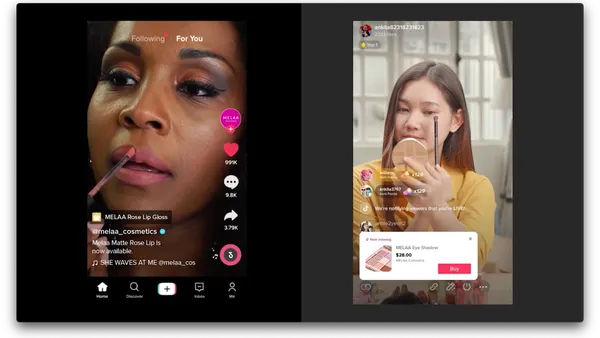Dive Brief:
- With 43% of those surveyed reporting they make weekly purchases with their smartphones, global mobile commerce is expect to peak in the coming years, according to a study by Ericsson Consumer and IndustryLab.
- The majority of mobile shoppers, 63%, expect most people will have a personal shopping advisor based on artificial intelligence within three years. There is an emerging demand for digital shopping assistants that will help with purchase decisions, from giving advice on style to narrowing product options and getting the best price, even negotiating with salespeople, according to a press release. They are also expected to handle more mundane tasks like returns, refunds, receiving deliveries when not home and household restocking chores.
- Among users of augmented reality and virtual reality, 69% think these technologies will give smartphones all the benefits of physical stores within three years.
Dive Insight:
A future world where mobile-based AI technology permeates the most-loved and most-hated aspects of shopping is outlined in the new report, "Beyond Smartphone Shopping – the Rise of Smart Assistants," from Ericsson Consumer and IndustryLab.
Will all shopping take place through the mobile device and physical stores disappear? Lest anyone think this is some kind of update of the old "Jetsons" TV show, the report’s authors acknowledge that is not realistic, although it does point to the changing role of the retail store. The sample of smartphone shoppers have a 34% lower preference for shopping in brick-and-mortar stores, and the report concludes that both size and location of physical stores will have to change to attract new interest from shoppers.
Survey respondents also recognized issues about privacy in the future, and addressed the question: "To what extent can digital shopping assistants be trusted, and how will they impact consumers?" Additionally, the social aspect of shopping won’t go away any time soon, as 40% of mobile shoppers frequently go to shopping malls to meet friends. In Shanghai, a city where smartphone shopping is widespread, some 43% said they go to malls "to just enjoy looking at everything."
The report is based on an online survey carried out in January 2018, of 5,048 (500 per city) advanced internet users in Johannesburg, London, Mexico City, Moscow, New York, San Francisco, São Paulo, Shanghai, Sydney and Tokyo. Respondents were aged 15 to 69 and fit the profile of urban early adopters.
"Smartphone shopping will continue to peak on a global scale over the next few years, as the store moves into every user's hand," the report said. "However, we are already seeing the next wave of disruption coming – the rise of AI-based assisted shopping. We see smartphone users relying increasingly on the digital assistants in their phones for aspirational shopping support, while simultaneously driving interest in smart speakers that handle automation of routine household purchases."
Some of the trends predicted by the study are already happening. For example, the study noted how AR and VR will give customers the benefits of stores on their devices, and Six Hundred Four, a fashion-forward sneaker store in Vancouver, Canada, is doing just that. It presents a VR version of the physical store from which consumers can shop, view original artwork and order shoes via an e-commerce platform.
Barneys New York used a VR experience to kick off its spring marketing campaign, blending fashion, technology and contemporary dance. Walmart’s tech incubator Store No. 8 is developing, exploring and presenting new uses of VR content. Lowes is using AR to enable customers to explore its spring collection and Amazon is testing a 3-D body scanning unit acquired through its purchase of body model startup Body Labs in an effort to develop an apparel-fitting service.













